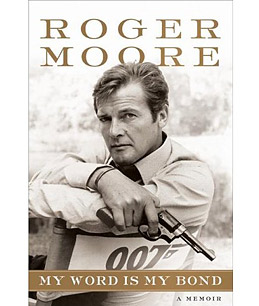
Roger Moore, My Word Is My Bond
As a celebrity memoirist Roger Moore trips at the first hurdle. In the foreword to My Word Is My Bond, Moore promises to deliver "a fun book with no recycled scandal, tittle-tattle or dirtdishing." This seems to me to reflect a fundamental misunderstanding on Moore's part of the genre to which he is contributing. Fortunately for us Moore is not quite as good as his word.
Most celebrities can't write, and neither can the people they pay to write for them. But there's something compelling about a good celebrity memoir just because it's so achingly predictable: the humble beginnings of the plucky, plain little waif from Nowheresville, the chance discovery, the lucky break, the pieces of a fabulously successful and lucrative career magically magnetizing together. (For a lengthier and smarter consideration of this topic see the late David Foster Wallace's "How Tracy Austin Broke My Heart," an extended review of Austin's Beyond Center Court: My Story collected in Wallace's Consider the Lobster.) And they have a funny mirrors-within-mirrors, mise-en-abyme effect: they pull back the smooth glossy surface of familiar images and show us the rough, grainy verso. Despite being outside the boundaries of anything remotely resembling literary quality, Moore's book delivers on both counts.
Moore wasn't exactly a waif. Born in 1927, he was the son of a happily married London policeman. Moore had more than his share of childhood illnesses — tonsils, pneumonia — but still succeeded in growing up into an almost freakishly handsome young man. His first love was drawing and animation, but one day — he must have been around 17 — he tagged along with some chums to pick up work as a film extra. A friendly director put him up for an audition at the Royal Academy of Dramatic Art. "As I stood on the stage, I knew at that moment that all I'd ever wanted to be was an actor. I'd found my true vocation." So you had, Rog.
Or had he? Moore's real talent isn't so much acting as having a good time while acting on the side. Say what you like about him, Moore is not vain, and he doesn't have exaggerated ideas about his abilities as a thespian. He cheerfully cops to having been the most lightweight of Bonds. He presents himself as a cheerfully overgrown boy blessed with astounding leading-man looks, a greater-than-average air of aplomb, the bare minimum of dramatic talent and no intellectual gifts or hidden depths to speak of. His greatest joys in life are his children, eating, drinking, getting married to diverse women and laughing at his own or other people's farts.
But he paid his dues. He kicked around various movie studios and did minor TV work — Maverick, The Alaskans, Ivanhoe — for years before The Saint landed in his lap. It was heaven-sent: just like that he was famous and rich, and after moving on to a one-season series, The Persuaders with Tony Curtis, he was more so. (Curtis comes across as a crusty and eccentric character whose obsession with his gloves was so great that he left them on when he washed his hands. In his own memoir, also out this month, Curtis describes himself and Moore as "the best of friends." Both actors recount an incident in which Curtis used the c-word on guest-star Joan Collins; interestingly, their stories square completely. Maybe they compared notes.)
From there Moore stepped easily into the lethal tuxedos of 007 (Read Richard Corliss' review of the new Bond film, Quantum of Solace). There are no bombshells in My Word Is My Bond, or if there are Q must have cleverly disguised them as fart jokes. But there is plenty to interest people who avidly consume, as I do, the trivia pages of the Internet Movie Database. It may interest you to know, for example, that during the filming of Live and Let Die, Moore's first outing as Bond, he had a kidney stone episode for which he took a painkiller, methylene, that both knocked him out and turned his urine blue. Waking up in the middle of the night, he mistook his closet for a bathroom and peed all over his clothes, dying them a delightful azure.